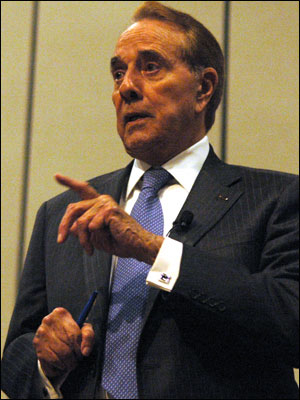THE GESTATION of Bob Dole's tax-cut proposal nears full term; any day now the candidate will give birth to an economic "growth" manifesto centered on taxpayer relief. Its major elements we already know: Tax reductions worth $600 billion over six years, an exemption from capital gains taxes for small businesses, and tighter reins on the IRS. The cornerstone of Dole's plan, it is reported, will be either an across-the-board cut in tax rates, or a rollback of the last two major tax increases -- George Bush's in 1990 and Bill Clinton's in 1993.
All in all, not a bad package, and if the Republican campaigning for it were Jack Kemp, Steve Forbes, or Christie Whitman, taxpayers would have a presidential candidate to cheer for. But Dole? Believability-wise, a promise from Dole to cut taxes is like those letters I get from Publishers Clearinghouse -- "YOU, JEFF JACOBY, MAY HAVE WON TEN MILLION DOLLARS!!" It could theoretically happen, but no sane person would count on it.
Cutting tax rates to propel the economy is the cornerstone of supply-side economics, a discipline with which Dole, to put it mildly, has never been identified. In the 1980s, he used to joke that he had good news and bad news. The good news: A bus carrying supply-siders had gone over a cliff. The bad news? "There were three empty seats." Ha ha.
 "The tax collector for the welfare state" — Bob Dole's history of supporting tax increases has long been a sore point with many Republicans. |
Dole's joke is legendary now. So is the label pinned on him in 1982, the year he muscled the Tax Equity and Fiscal Responsibility Act to passage. TEFRA was one of the largest tax increases in US history -- it cost $215 billion in its first five years -- and many conservatives agreed with the House sophomore from Georgia who angrily dubbed Dole "the tax collector for the welfare state." That sophomore is now the House speaker. He still champions tax reduction; Dole still doesn't. (Newt Gingrich on tax cuts, March 1995: "The crowning jewel in the Contract with America." Bob Dole on tax cuts, March 1995: "I'm not certain our tax cuts will be as much as the House sends over. I mean, you know, let's face it, they made this Contract.")
It would be reassuring to report that TEFRA was an anomaly. But in a world filled with ambiguities, few things have been as certain as Dole and taxes.
In 1983, as Senate Finance Committee chairman, Dole engineered the "rescue" of Social Security -- a stiff increase in payroll taxes that set an enormous yoke on the necks of younger workers. In 1984, he voted for yet another package of tax increases. And still another in 1985. And in 1986, 1987, 1988, and 1989.
Then, as budget scholar Stephen Moore of the Cato Institute puts it, "came the GOP's darkest hour, George Bush's 1990 budget deal, with Bob Dole leading the way." Dole not only failed to warn Bush against breaking his famous "read my lips" vow, he mocked Republicans who did as wimps who "never made a tough vote in their lives." Thanks in large part to Dole's efforts, income taxes went up, gasoline taxes went up, beer and wine taxes went up, "luxury" taxes went up, airline ticket taxes went up, and payroll taxes went up. With so many "revenue enhancements," did federal deficits, at least, go down? No, they went up too. Bush's presidency, on the other hand, plummeted.
To be fair, Dole hasn't always favored higher taxes. He helped push the landmark Kemp-Roth tax cuts through the Senate in 1981. In 1993, he fought to block Clinton's $265 billion tax increase. (It passed by just one vote, with every Republican opposed.) And as he geared up to run for president this time, Dole signed the no-new-taxes pledge he had spurned in 1988.
So perhaps, after all these years, Dole finally agrees that Americans are overtaxed. Perhaps he has come to see that letting them keep more of their own wages is the key to both economic justice and economic growth. Perhaps he realizes at last that tax reduction and deficit reduction are not conflicting objectives, but complementary ones.
Perhaps.
But then why does he give every impression of a man being prodded into adopting an issue he finds distasteful? News reports invariably describe his newfound embrace of tax relief with phrases like "a way of giving a boost to Dole's campaign" (Washington Post) or "a great relief to Republican leaders who've been pressing Dole to do something bold" (CBS). When Ronald Reagan called for cutting taxes, no one looked for ulterior motives.
Dole is 73, and while 73-year-olds can do many things, abandoning long-held views is rarely one of them. This is a man with a long, long history of eyeing tax relief suspiciously. (He even voted against President Kennedy's supply-side tax cuts in 1963.) Would he be talking about tax cuts today if he weren't 15 points behind in the polls?
The tax issue is a powerful one for Republicans. It was essential to their White House victories in 1980, 1984, and 1988 -- and to their loss in 1992. Without it, Dole cannot hope to win. But he cannot hope to win with it, either, unless his stand is one of principle, not just politics.
Four years ago, Bill Clinton repeatedly promised a "middle class tax cut." That promise lies in shards today, and the burden on American taxpayers is worse than ever. Is Bob Dole really the man to lighten their load? I'm waiting to be convinced.
(Jeff Jacoby is a columnist for The Boston Globe).
-- ## --
Follow Jeff Jacoby on Twitter.
Join the Fans of Jeff Jacoby on Facebook.

